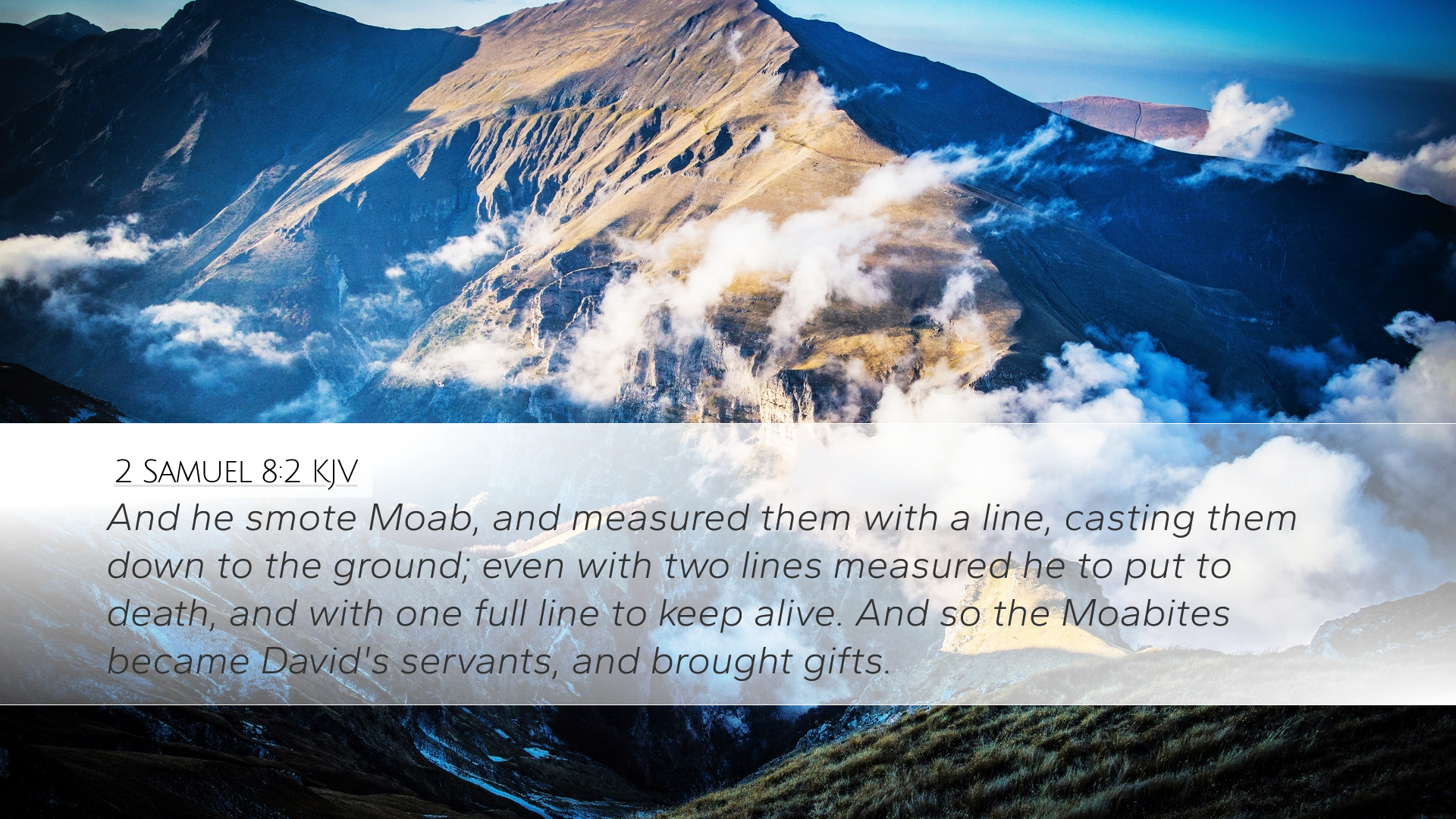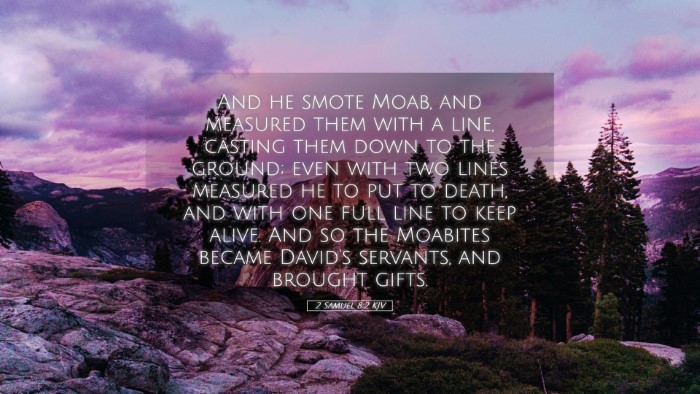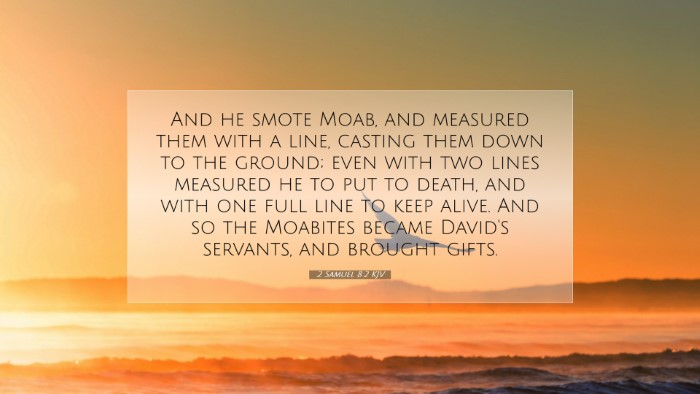Old Testament
Genesis Exodus Leviticus Numbers Deuteronomy Joshua Judges Ruth 1 Samuel 2 Samuel 1 Kings 2 Kings 1 Chronicles 2 Chronicles Ezra Nehemiah Esther Job Psalms Proverbs Ecclesiastes Song of Solomon Isaiah Jeremiah Lamentations Ezekiel Daniel Hosea Joel Amos Obadiah Jonah Micah Nahum Habakkuk Zephaniah Haggai Zechariah Malachi2 Samuel 8:2
2 Samuel 8:2 KJV
And he smote Moab, and measured them with a line, casting them down to the ground; even with two lines measured he to put to death, and with one full line to keep alive. And so the Moabites became David's servants, and brought gifts.
2 Samuel 8:2 Bible Commentary
Commentary on 2 Samuel 8:2
Verse: "And he smote Moab, and measured them with a line, casting them down to the ground; even with two lines measured he to put to death, and with one full line to keep alive. And so the Moabites became David's servants, and brought gifts."
Introduction
This verse is critical in understanding David's military campaigns and the establishment of his kingdom. In 2 Samuel 8:2, we witness David’s conquest over Moab, illustrating both his military strategy and the geopolitical dynamics of the era. This commentary will explore the theological implications, historical context, and practical applications from public domain resources.
Historical Context
The account of David's victory over Moab comes in the context of a series of military achievements that helped solidify his reign over Israel. Following Saul's fall, David faced various nations that opposed his kingship. Moab, historically connected to Israel through familial ties (Genesis 19:37-38), had fluctuated between hostility and subservience to Israel.
Matthew Henry's Perspective
Matthew Henry writes passionately about David's method of measuring the captured people like a surveyor measures land. He emphasizes that this approach signifies both a display of power and a means of maintaining order among the subjugated. Henry draws attention to the harshness of the decree but explains that it indicates the seriousness of sin and rebellion against God's chosen king.
Albert Barnes' Insights
Albert Barnes observes that David's military might involved both ruthlessness and practicality. He suggests that the practice of measuring the captives by lines to determine their fate reveals the grim reality of ancient warfare where conquest meant total dominance. Barnes adds that such actions were commonplace in ancient near-Eastern warfare, thereby contextualizing David's actions within the norms of his time.
Adam Clarke's Exegesis
Adam Clarke provides a more detailed exploration of the terms used in this passage, particularly focusing on the phrase "measured them with a line." He posits that this measurement reflected a systematic approach to warfare and subjugation. Clarke also highlights the theological implications—David's actions were not merely pragmatic but were seen as an execution of divine judgment against a nation that had often opposed Israel.
Theological Implications
- Divine Sovereignty: This passage illustrates the sovereignty of God in choosing David and empowering him to establish the kingdom of Israel, consequentially controlling the fate of surrounding nations.
- Judgment and Mercy: The act of putting to death versus keeping alive symbolizes God's judgment against sin while still allowing for mercy towards some. It reflects the tension present in the divine will regarding justice and grace.
- Servitude and Loyalty: The phrase "the Moabites became David's servants" raises questions about the nature of loyalty and subservience in human relationships. It sets a precedent for the diplomatic relations that would develop later.
Practical Applications
For pastors, students, and theologians, 2 Samuel 8:2 serves as a poignant reminder of the complexities of leadership, warfare, and the ethical dilemmas that accompany power. Here are some key applications:
- Reflection on Power: Leaders must grapple with the implications of their authority and the actions they take in its exercise. How do we balance decisiveness and mercy?
- Historical Understanding: An appreciation of biblical history enhances our understanding of the text. It is vital to consider the cultural and historical background when interpreting scripture.
- Theological Reflection: In examining God's judgment, we should reflect on how grace operates within judgment. Christians are called to live in the tension between justice and mercy.
Conclusion
2 Samuel 8:2, as part of the larger narrative of David's reign, invites deep reflection on the nature of God’s dealings with humanity through established leaders. The comments from Henry, Barnes, and Clarke provide a multifaceted view of this verse, encouraging modern readers to engage with the text both historically and theologically. As we contemplate this passage, may we be inspired to lead with integrity and to understand our own positions of authority in the light of divine sovereignty.


